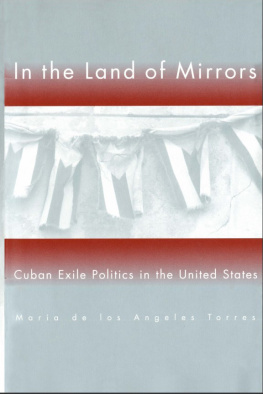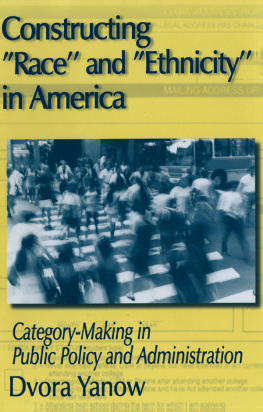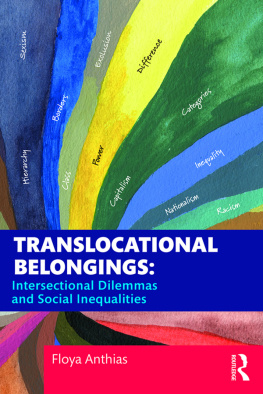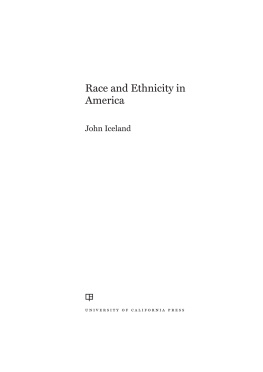ETHNICITY AND OLD AGE
Expanding our imagination
Sandra Torres
First published in Great Britain in 2019 by
Policy Press University of Bristol 1-9 Old Park Hill Bristol BS2 8BB UK Tel +44 (0)117 954 5940 e-mail
North American office: Policy Press c/o The University of Chicago Press 1427 East 60th Street Chicago, IL 60637, USA t: +1 773 702 7700 f: +1 773-702-9756 e:
Policy Press 2019
British Library Cataloguing in Publication Data
A catalogue record for this book is available from the British Library
Library of Congress Cataloging-in-Publication Data
A catalog record for this book has been requested
ISBN 978-1-4473-2811-7 hardcover
ISBN 978-1-4473-2815-5 ePub
ISBN 978-1-4473-2816-2 Mobi
ISBN 978-1-4473-2814-8 ePdf
The right of Sandra Torres to be identified as author of this work has been asserted by her in accordance with the Copyright, Designs and Patents Act 1988.
All rights reserved: no part of this publication may be reproduced, stored in a retrieval system, or transmitted in any form or by any means, electronic, mechanical, photocopying, recording, or otherwise without the prior permission of Policy Press.
The statements and opinions contained within this publication are solely those of the author and not of the University of Bristol or Policy Press. The University of Bristol and Policy Press disclaim responsibility for any injury to persons or property resulting from any material published in this publication.
Policy Press works to counter discrimination on grounds of gender, race, disability, age and sexuality.
Cover design by Policy Press
Front cover image: istock
Readers Guide
This book has been optimised for PDA.
Tables may have been presented to accommodate this devices limitations.
Image presentation is limited by this devices limitations.
Contents
About the author
Sandra Torres is Professor in Sociology and Chair in Social Gerontology at Uppsala University, Sweden. As a sociologist of ageing and a critical social gerontologist, her work problematises old age-related constructs and deconstructs some of the taken for granted assumptions that inform research, policy and practice. Her main scholarly contributions come from studies that have used the sociology of migration and ethnicity to expand the social gerontological imagination. In 2016, she co-edited two anthologies for Routledge: Ageing in contexts of migration (with Ute Karl) and Older people and migration: Challenges for social work (with Susan Lawrence). She is also the co-editor (with Finnur Magnsson) of a book in Swedish titled Invandrarskap, ldrevrd och omsorg (Migrantship in elderly care). Elected into the (Swedish) Royal Society of Sciences in 2016, she is also a fellow of the Gerontological Society of America (GSA), president of the Research Committee on Aging (RC11) of the International Sociological Association and co-chairs (with Allen Glicksman) the Interest Group on International Aging and Migration of GSA.
Series editors preface
Chris Phillipson (University of Manchester, UK) Toni Calasanti (Virginia, Tech, USA) Thomas Scharf (University of Newcastle, UK)
As the global older population continues to expand, new issues and concerns arise for consideration by academics, policy makers and health and social care professionals worldwide. Ageing in a Global Context is a series of books, published by Policy Press in association with the British Society of Gerontology, which aims to influence and transform debates in what has become a fast-moving field in research and policy. The series seeks to achieve this in three main ways. First, through publishing books which rethink the key questions shaping debates in the study of ageing. This has become especially important given the restructuring of welfare states alongside the complex nature of population change, with both elements opening up the need to explore themes which go beyond traditional perspectives in social gerontology. Second, the series represents a response to the impact of globalisation and related processes, thus contributing to the erosion of the national boundaries which originally framed the study of ageing. From this has come the emergence of issues explored in various contributions to the series; for example, the impact of cultural diversity, transnational migration, new forms of inequality, environmental issues and ageing, and related developments. Third, a key aim of the series is to explore interdisciplinary connections in gerontology. Contributions will provide a critical assessment of the disciplinary boundaries and territories influencing the study of ageing, creating in the process new perspectives and approaches relevant to the 21st century.
Given the aims of the series, we are especially pleased to include a study which connects research in social gerontology with advances in scholarship in the field of ethnicity. Research focusing on issues relating to ethnicity has, especially in the case of Europe, tended to remain on the margins of work in the field of ageing. However, there is now some urgency in making ethnicity a core area of research in social gerontology. Demographic change will itself be a central driver in this process, with ethnic diversity increasingly characteristic of older as much as younger populations. But the broader social changes are equally important, in particular those associated with the rise of transnational communities, the impact of global migration, the influence of different ethnic groups on neighbourhoods and communities, and the complex interaction between ethnicity and other key social statuses notably age, class, gender and sexuality. This book provides a major reassessment of the intersection between ethnicity and research in the field of ageing, addressing in the process many of the key challenges facing researchers seeking to understand the global forces reshaping the lives of older people and the communities in which they live.
Preface
Writing a book is not an easy task. When the book one is working on is a scholarly contribution, as this one is, it is not uncommon to think about this momentous task in terms of what one wants to contribute to the scholarly debates that one has been following for years, which have ignited the commitment needed to embark on a book project. Spelling out what I personally wanted to accomplish with this book seemed like an appropriate way to start when I first thought about what this preface would be about. But the more I pondered on what to write, the more I realised that I wanted to do justice to the journey that has led me here. Because book projects are quite often journeys. As such, they take us from one destination to another along whirlwind roads often taken while gaining clarity regarding where you are heading and why. It is because of this that I decided to use this preface to tell the story of why I decided to write a book about ethnicity and old age in order to expand my own, as well as my peers, imagination.
Telling this story requires that I start from the very beginning, since I need to do justice to how this journey started and what it has meant to my scholarly self. When I first enrolled in the doctoral programme in sociology back in the mid-1990s here in Sweden, there was no one else who shared my research interests. Back then, I was conducting what people back home (and now I mean the US) often refer to as ethno- or anthropo-gerontology research and nobody in my department other than my supervisor thought I was on to something. Few sociologists in Sweden were interested in old age back then. Ethnicity and migration scholars in this country had yet to consider that old age was a part of the life course that deserved their attention. Consequently, finding a scholarly community that I could call my own was not easy when I first started out in academia. I remember how lonely I felt while attending international sociology of ageing conferences in the beginning, since nobody was working on issues related to culture and migration. I have actually lost count of the number of times I presented a paper on successful ageing (the topic of my dissertation) at either a sociology (or a gerontology) conference where I was placed in a session on older migrants since my empirical work was about Iranian migrants in Sweden. And back then, work on older migrants was not deemed to be relevant enough to the successful ageing debate. The fact that I was commissioned to write a piece on cultural values and successful ageing for the









